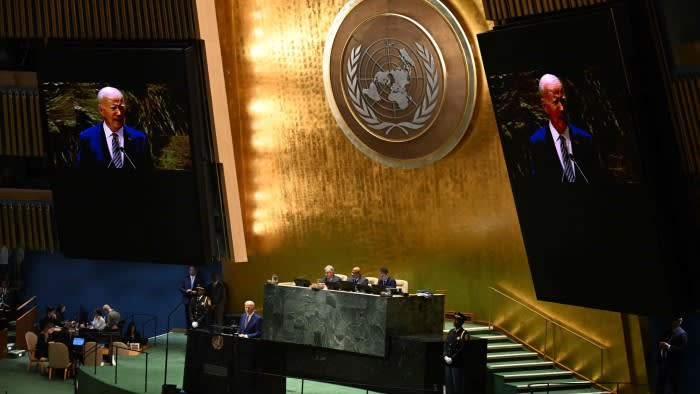This article is an on-site version of our Europe Express newsletter. Premium subscribers can sign up here to get the newsletter delivered every weekday and Saturday morning. Standard subscribers can upgrade to Premium here, or explore all FT newsletters
Good morning. Germany’s Social Democrats snatched a narrow regional election victory over the far-right Alternative for Germany yesterday, winning Chancellor Olaf Scholz an unexpected reprieve from calls that he allow someone else to lead the party into the next national election.
Today, we set out the stakes for Europe at the UN this week, and report on a decision by Brussels not to block oil drilling that endangers Greek marine life.
Crunch time
World leaders are descending on New York for the UN’s General Assembly this week for a session billed as particularly pivotal amid uncertainty over the future of support for Ukraine and global climate policy, writes Alice Hancock.
Context: Delegates from the UN’s 193 members are gathering against a backdrop of deepening conflicts in Gaza, Ukraine and Sudan, trade tensions, and increasing desperation over the state of the planet’s health.
Ahead of the gathering, UN secretary-general António Guterres warned that “global institutions and frameworks are today totally inadequate” to deal with the “complex and even existential challenges”, and said he hoped to rally leaders behind a “vision for the future”.
But the UN is not a decision-making body, and the gathering can only signal opinions on the global state of affairs through resolutions. Bilateral meetings and chatter in the corridors are often far more consequential.
For Ukraine, it could be a defining week for the future of global support, two and a half years after Russia’s full-scale invasion.
Ukrainian President Volodymyr Zelenskyy will address UNGA on Wednesday, before travelling to Washington DC to meet US President Joe Biden in a last-ditch attempt to persuade Biden to back a “victory plan” before his presidency ends in January.
“This is a historical mission,” Zelenskyy told reporters last week. Zelenskyy will also meet US presidential candidate Donald Trump. Russian President Vladimir Putin will not attend UNGA.
Today, the G7 and EU foreign ministers meet together with the bloc’s chief diplomat Josep Borrell to discuss Ukraine and the destruction of its energy sector from Russian strikes. Another hot topic: whether the EU will lift its restrictions on Ukraine using western weapons to hit Russian military targets.
In back rooms elsewhere, harried climate envoys will use the last major global event before the COP29 climate conference in Azerbaijan this November to prepare a deal. The hope is that countries can agree on a figure for long-term climate finance in Baku, and sustain momentum on the phaseout of fossil fuels.
But European officials are not optimistic.
A European diplomat said that the talks so far had been “horribly not promising with unfortunately outsize expectations from developing countries”.
Chart du jour: Consequences
The world has experienced its hottest three-month period to August on record, with extreme weather causing floods in Europe. Meanwhile, the EU’s chief climate scientist has warned the EU will miss its climate targets if it does not force farmers to pay for emissions.
Hands off
The European Commission will not pursue a complaint by environmental NGOs about Greece approving oil and gas projects near protected natural sites, endangering whales, dolphins and loggerhead turtles, writes Daria Mosolova.
Context: ClientEarth, WWF and Greenpeace filed a complaint with the commission in December last year, urging Brussels to take action against Greece for what they say are breaches of EU climate laws in favour of offshore drilling.
In an official reply seen by the Financial Times, the commission said it would not. As the guardian of the EU treaties, the commission can open infringement proceedings against member states breaching EU law. But it argued that in individual cases of transgressions, it was up to national authorities to act.
“The European Commission is the guardian and enforcer of EU laws yet their reply suggests an unwillingness to engage,” said ClientEarth lawyer Francesco Maletto.
“It is clear, in the present case, the national court is not safeguarding EU law, but rather endorsing a blatant disregard of its obligations,” he added with regard to a previous decision by a Greek court.
EU rules on offshore oil and gas drilling require national authorities to assess the environmental impact of such projects on marine life in protected areas, known as Natura 2000 sites, before approving them.
According to climate activists, Greece has over the years granted at least six oil and gas companies concessions for damaging activities in the Hellenic Trench, a recognised biodiversity reservoir.
Researchers at WWF Greece have also warned that offshore drilling could compromise some of the country’s best-known tourist destinations, including the islands of Corfu, Zakynthos and Crete.
The number of infringement cases opened by the commission has declined in recent years, raising concerns from environmentalists that a more hands-off approach could scupper the union’s long-term climate goals.
The commission did not respond to a request for comment.
What to watch today
-
EU and western partners hold sanctions co-ordination forum in Brussels.
-
EU agriculture and fisheries ministers meet.
Now read these
Recommended newsletters for you
Trade Secrets — A must-read on the changing face of international trade and globalisation. Sign up here
Swamp Notes — Expert insight on the intersection of money and power in US politics. Sign up here
Are you enjoying Europe Express? Sign up here to have it delivered straight to your inbox every workday at 7am CET and on Saturdays at noon CET. Do tell us what you think, we love to hear from you: europe.express@ft.com. Keep up with the latest European stories @FT Europe


